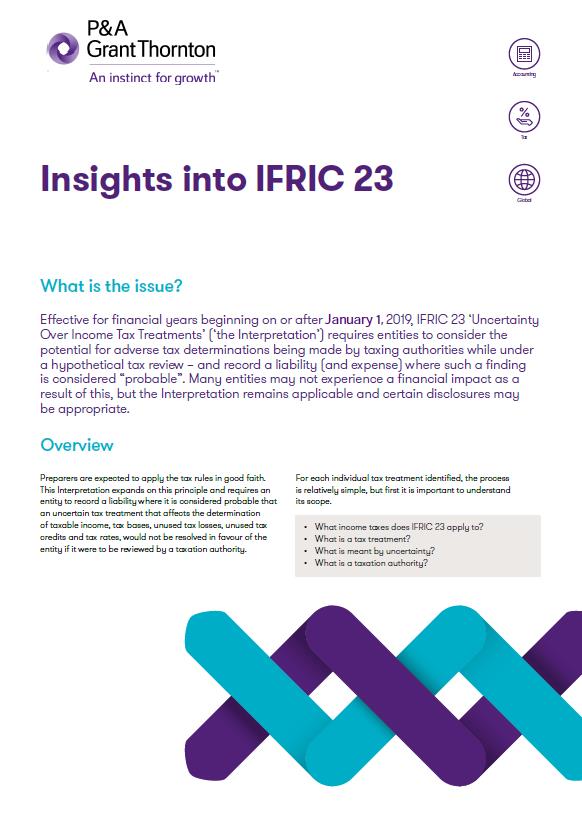This Accounting Alert is issued to provide guidance on uncertainty over income tax treatments.
Overview
Effective for financial years beginning on or after January 1, 2019, IFRIC 23 ‘Uncertainty Over Income Tax Treatments’ (‘the Interpretation’) requires entities to consider the potential for adverse tax determinations being made by taxing authorities while under a hypothetical tax review – and record a liability (and expense) where such a finding is considered “probable”. Many entities may not experience a financial impact as a result of this, but the Interpretation remains applicable and certain disclosures may be appropriate.
What taxes does IFRIC 23 apply to?
IFRIC 23 applies to any tax that is an ‘income tax’ as defined by paragraph 2 of PAS 12 ‘Income Taxes’, which states that income taxes include all domestic and foreign taxes which are based on taxable profits. Income taxes also include taxes, such as withholding taxes, which are payable by a subsidiary, associate or joint arrangement on distributions to the reporting entity.’
Initial tax assessment
Once a tax treatment has been identified and deemed to be uncertain, a judgment must be made as to whether it is not probable that a taxation authority will uphold the entity’s tax treatment. The assessment should be made on the basis that it is expected that the taxation authority will examine the transaction and will have full knowledge of all the information needed to assess the conformity of the tax treatment. It is therefore not possible for the entity to take into account the probability of examination when determining whether the taxation authority will accept the treatment retained even though there is a time limit on the right of the taxation authority to examine income tax filings.
Subsequent measurement
Any change in facts and circumstances should be accounted for as a change in accounting estimate in accordance with PAS 8 ‘Accounting Policies, Changes in Accounting Estimates and Errors’. Consideration of events that give rise to a change in facts and circumstances after the balance sheet date must be considered in the context of PAS 10 ‘Events after the Reporting Period’ to determine whether an event is an adjusting or non-adjusting event. Over time, tax treatments will be identified, included in assessing the potential liability, and then removed as the right to examine or re-examine expires.
Disclosures
The disclosure requirements in the Interpretation are open to significant judgment and should be tailored to the needs of the users and management’s assessment of materiality as it considers the potential impacts. We would recommend preparers of financial statements consider disclosing:
- The policy for identifying uncertain tax treatments including judgments made in determining taxable profit, tax bases, unused tax losses, unused tax credits and tax rates
- The policy for measuring uncertain tax treatments including Information about the assumptions and estimates made in determining taxable profit, tax bases, unused tax losses, unused tax credits and tax rates in disclosing sources of estimation uncertainty
- Key limitations on exposure to uncertain tax treatments, such as the periods currently under potential inspection by taxation authorities, and
- Qualitative and quantitative disclosures related to individually material uncertain tax treatments including if acceptance of an uncertain tax treatment is probable, potentially disclose the potential effect as a tax-related contingency.
The accounting alert also discusses examples of tax treatments, common sources of uncertain tax treatments and brief practical guidance for the application of IFRIC 23.
See attached Accounting Alert for further details.

